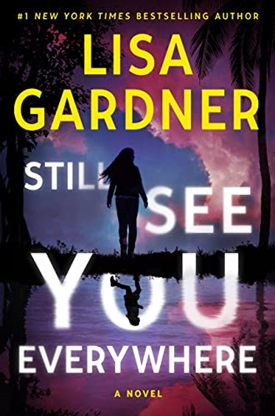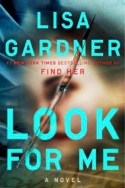 Synopsis:
Synopsis:
Frankie Elkin is an expert at finding the missing persons the rest of the world has forgotten, but even she couldn’t have anticipated the latest request she has received: to locate the long-lost sister of a female serial killer facing execution in three weeks.
She has called herself “death,” but people called her the devil.
The case was sensational. Keahi “Kaylee” Pierson confessed from the very beginning and waived all appeals. Despite the media’s chronicling of her tragic circumstances — the childhood spent with a violent father — no one could muster any sympathy for “the Beautiful Butcher” who led eighteen men home from bars before viciously slitting their throats.
Now, with only twenty-one days left to live, Pierson has finally received a lead on the whereabouts of her younger sister, who was kidnapped over a decade ago. She needs Frankie’s help to find her.
The Beautiful Butcher’s offer is compelling:
When was the last time your search ended with finding the living?
Unable to resist the chance to rescue a missing person, Frankie takes on Pierson’s request.
Twelve years ago, five-year-old Leilani went missing in Hawaii. The main suspect? Pierson’s tech mogul ex-boyfriend, Sanders MacManus.
Now, on a remote, uninhabited island in the middle of the Pacific Ocean — the site of MacManus’s latest vanity project — fresh evidence has been discovered. To learn the truth, and possibly save a young woman’s life, Frankie goes undercover at the isolated base camp amid a dozen strangers, countless dangers, secrets . . . and zero means of summoning help.
And then the storm rolls in . . .
Review:

Frankie Elkin, the ordinary but strong woman with a troubled past and a mission to locate missing persons, was introduced by bestselling author Lisa Gardner in Before She Disappeared. She joined a search party looking for a long-lost hiker in One Step Too Far. Gardner did not set out to write a series centered around Frankie and, in fact, approaches penning every book as though it is a stand-alone story, so readers can enjoy them as such.
The character of Frankie was inspired by an article Gardner happened upon about Lissa Yellowbird-Chase, a woman who gave up everything in order to pursue cold cases because she was so troubled by the knowledge that too many missing children of color are forgotten, the mysteries surrounding their disappearances never solved. Gardner found Yellowbird-Chase’s commitment “a bit mesmerizing” and wondered, “What would that look like?” She decided to explore that question via Frankie’s fictional journeys.
In late 2021, after thirty years of drafting bestselling novels, Gardner took a one-year sabbatical to “explore the world.” During that year, she did not write at all. Instead, she traversed the globe from Antarctica “to a crab-covered atoll near the equator, to the polar bear-populated shores of the Arctic” and, luckily for readers, after “extraordinary adventures,” returned to her career “inspired about thirty new novels in my head.” The first to be published is Still See Her Everywhere.
Gardner says the “whole book was based on time she spent on the Palmyra,” a beautiful atoll an hour away from Hawaii,” populated by carnivorous coconut crabs with claws that operate like hydraulics and wolf spiders, both of which feature in the tale. Gardner sets the story on a similar, fictional atoll called Pomaikai which, ironically, means “good fortune, blessed, fortunate.” It’s a so-far unspoiled paradise a one-hour flight away from Honolulu. The trails on Pomaikai are dominated by hordes of hermit crabs. But a tech mogul is intent upon following in the footsteps of Marlon Brando, who filmed a movie on Tetiaroa in French Polynesia and loved it so much, he set out to construct the world’s first-ever eco-friendly, sustainable resort there. Indeed, the Brando Resort was completed in 2014 and named the best in the world by Conde Nast.
“Finding missing people is what I do,” Frankie explains in the first-person narrative Gardner again employs to relate the latest chapter in her adventures. “When the police have given up, when the public no longer remembers, when the media has never bothered to care, I start looking. For no money, no recognition, and most of the time, with no help.” Frankie has no home, no belongings, no roots. She travels from place to place to pursue cases that capture her interest. She has no investigative training or law enforcement experience, but is an adept listener, observes body language and mannerisms, and relies mostly on gut instinct. Gardner describes Frankie as a fortyish woman going “all the places most of us would never go,” often searching for missing persons “on the fringe of society.” She tells herself that she is strong and can handle anything, but Gardener questions that — “Can she? Do any of us?” – so, internally, Frankie does, as well. An alcoholic struggling day-by-day to remain sober, she often seeks out Alcoholics Anonymous meetings wherever she lands, and aspects of her complicated past haunt her dreams and memories. Gardner reveals that Frankie remains traumatized by her most recent case which was the subject of One Step Too Far. It was a terrifying ordeal she barely survived, while some of her fellow searchers did not.
As the story opens, Frankie has agreed to meet with Keahi, aka Kaylee, Pierson, a thirty-two-year-old condemned serial killer incarcerated in Gatesville, Texas. She is scheduled to be executed by lethal injection in the notorious Huntsville Unit, the most active execution chamber in the United States, in just three weeks. Keahi (meaning “fire”) was convicted of murder. Eighteen murders, in fact, and dubbed the “Beautiful Butcher” because she dismembered her victims and fed their remains to her pigs. She is unrepentant. She has never denied committing the crimes for which she stood trial and has rejected all efforts to have her conviction or sentence overturned. She has made clear that she is guilty and ready to die.
During their meeting, Keahi explains her childhood with a father who was “a monster” and how she served as her younger sister Leilani’s protector. She details how the two of them escaped to Hawaii where they lived with their auntie for two years during which Keahi told everyone that Leilani, aka Lea, just three years old, was her daughter. When she fell in love with tech mogul Sanders “Mac” McManus, they went to live in his villa with him, but like their father, he proved to be abusive. After a particularly violent incident, Mac spirited Lea away while Keahi was hospitalized, recovering from the injuries Mac inflicted upon her. Thereafter, she spent two years scouring Honolulu for Lea to no avail before returning to Texas and embarking on the murder spree that ultimately landed her in prison.
Keahi claims that she recently received a handwritten letter from Lea, now seventeen years old, confirming that she has been with Mac since that horrid night . . . and fears him. Lea allegedly wrote that she remembers and will always miss Keahi. She insists she has not notified authorities because she believes they will not pursue this new evidence of Lea’s whereabouts since it is a cold case involving a powerful man with “a net worth greater than most developed countries.” Hawaii is an infamous sex trafficking hub, but resources are rarely expended searching for missing native Hawaiian girls. Not to mention the well-documented racial bias inherent in the imposition of the death penalty.
But nothing about the case feels right to Frankie, including the highly suspicious timing of Keahi’s receipt of Lea’s letter. “I have a sick feeling in my stomach. This is not my area of expertise. I don’t like violence of blood; there’s a reason I work missing persons and not murder cases.” But the chance to save a teenage girl who was ripped away from her family twelve years ago, and possibly held against her wishes by an influential and violent man is enticing. “Finding people no one else is looking for” is what Frankie does. So she tells Keahi’s lawyer, “I’m in it for Lea, just like I’m always working for the missing.”
Keahi’s attorney arranges for Frankie to work at the base camp on Pomaikai as a combination dishwasher, laundress, and supply tech, and her next adventure begins. Gardener’s fast-paced narrative details Frankie’s flight in Mac’s private jet to the beautiful atoll and her introduction to the island. She is welcomed by fifty-something cooks Trudy and Ann, who finish each other’s sentences and explain what life on the island is like. Frankie quickly learns she will be sharing her rustic cabin with a large, but harmless wolf spider, and must traverse the island cautiously for a variety of reasons. The team includes Charlie, the cantankerous and mysterious head engineer with an inconsistent accent; Ronin, the archeologist employed by the State of Hawai’i to scan for signs of previous Polynesian civilization and artifacts that must be protected and preserved; Emi, an ornithologist; Aolani, Mac’s architect, for whom the project represents an opportunity to make a name for herself; and the project manager, Vaughn, who has long been a friend and associate of Mac. Vaughn is a no-nonsense leader committing to the group’s safety who is immediately suspicious of Frankie because of the manner in which she was hired. “Our safety depends on one another. Which means we don’t screw around and we don’t lie,” he tells her.
Frankie is, of course, suspicious of the entire crew and immediately begins gathering as much information as she can about them, the island itself, and Mac, who maintains a residence on the island that is far more luxurious than the crew accommodations. He is expected to arrive soon with his ward – Lea! So Frankie’s search efforts must be both covert and swift.
Nothing is as it initially seemed. Frankie quickly discovers clues that bring Keahi’s story into question, leading her to ponder whether she has been lured to the island under false pretenses. If so, for what purpose? Can she trust any of her fellow employees? The discovery of a female body and acts of sabotage enhance the danger. Matters grow increasingly dire, as more and more surprising truths come to light and Frankie understands precisely why she was enlisted to conduct the investigation. Frankie also recognizes that she must trust some of her teammates – her survival, as well as theirs, depends on working with, rather than against them if they are to escape the island. But who can she rely on? Frankie learns about the other employees’ pasts and possible motivations for their presence on the island. There is definitely at least one traitor among them . . . and perhaps others are on the way. Just when it seems the situation could not be worse, another threat materializes. A tropical storm is set to wreak even more havoc on the island and further jeopardize the group’s safety.
Unlike the first two installments in the series, the story is more focused on Frankie’s search for Lea and the dangers she confronts. Gardner still examines her history and emotional struggles, though. She still thinks about Paul and a certain detective back in Boston, but the trauma she experienced in Wyoming is a fresher psychic wound. “I mourn a man in Wyoming,” she adds to her list of burdens. Frankie will never stop longing for the idea of love and security. But she knows herself well and is resigned to the fact that she is simply not cut out to lead a conventional life. The temptation to drink never fully abates. And she is exhausted. “I don’t recognize the person I see peering back at me from the mirror. Who is this too-thin woman with her hollowed-out cheeks, bruised eyes, and creased forehead?”
Once again, Frankie is surrounded by an eclectic cast of supporting characters which includes the setting – Pomaikai – to an even greater degree than the previous volumes in the series. Gardner incorporates details from her stay on Palmyra that bring the fictional atoll to life. She deftly contrasts the lush beauty of the isolated paradise with the myriad terror-inducing hazards that lurk there, both natural and human. Gardner’s narrative is propulsive, relentlessly tense, replete with shocking revelations and plot twists, and exciting. The story is both cleverly imagined and flawlessly rendered, another skillful blend of intrigue, unpredictability, and compassion. Frankie is an endlessly fascinating and empathetic character – a determined, tenacious woman who grapples daily with addiction, grief, guilt, and longings she knows will never be fulfilled or fulfilling.
The only disappointing aspect of Still See You Everywhere is how quickly readers will devour the story, leaving them anxiously waiting to read about Frankie’s next case.
Excerpt from Still See You Everywhere
PROLOGUE
I still see you everywhere.
I roam the gray-washed corridors of our old house, peering into shadowed rooms now populated by ghosts. I pass drywall still bearing the impact of Daddy’s fist. The dingy bathroom where he’d go fill the tub with that look in his eyes, and I knew to run, though I was never fast enough. Here’s the entryway where he cracked Mama’s prized koa-framed mirror. Here’s the dining room where he’d bend me over the chair while snapping out his leather belt.
And here’s the tiny bedroom where you and I slept together each night, our twin beds so close your outstretched fingertips could brush against mine. I remember your big brown eyes, peering at me solemnly in the dark. Then the sound of your hushed breath as you slowly drifted off, your hand slipping away.
I watched you sleep so many nights, your body a still lump under the covers, so unbelievably small. My throat would grow thick, my chest tight. And I’d murmur all sorts of nonsense, that I’d keep you safe, that I’d never let him touch you, that I’d always take care of you.
My love for you was an ache in my bones, a buzzing in my head, a terrible, immense sense of wonder that swelled my body and electrified my limbs.
No one has ever understood that. They judge me. Call me cold-hearted, evil incarnate. All while they gasp over every scintillating detail of my crimes, feigning horror at the body count, then cheering at the verdict: death sentence for the Beautiful Butcher.
And still, I see you everywhere.
Now I chase your shadow around a corner. I call out your name and beg you to come back to me. I follow your racing feet into our little room, where I collapse on your bed and fist the corners of your quilt, searching for some sign, some scent, to tell me you’re still here. That you haven’t left me totally.
That I didn’t fail you completely.
Mama’s gone. I didn’t cry a drop when I stood next to her grave. Didn’t have any tears left in me. Do you know? Are you with her? The two of you huddled together in some heavenly kitchen, where she’s braiding your hair and whispering all the secrets she’d never tell me. Have you discovered peace?
Because I awake each morning boiling over with pain and rage. Some days I add to Daddy’s holes in the walls. Others I clutch your old pajamas and shamelessly beg for your forgiveness. I cry and wail. Then I rock back and forth, crying and wailing some more. I’m not whole. I’m not sane.
I live with a hole in my chest and hate in my heart, and come nightfall . . .
It’s no wonder what I did most nights.
Right after Daddy’s passing, I stood in that same horrible bathroom and filled up bucket after bucket with hot water and Pine-Sol. I attacked the entire house. Room by room, mopping the floors, scouring the countertops, scrubbing the walls. Dining room chairs? Threw them into the front yard where I made my own little bonfire that scattered the chickens and made the goats bleat in protest. Daddy’s favorite recliner, where he’d lounge every night popping open beers and belching out his opinions? I took an ax to it — nothing like cheap furniture to burn, burn, burn. More skittering chickens and fussing goats.
But cleaning wasn’t enough. So I went room by room tearing down the heavy drapes and piling them in the corner. Let the light flood in. Let it burn every awful memory from this awful place in this awful town I swore I’d never see again.
Later, I changed my mind on that subject. I rehung the musty curtains, added blackout blinds. I came to crave the dark and the secrets it helped me protect.
I threw myself into daily life. Brew coffee, eat breakfast, gather eggs. Feed pigs, milk goats, muck stalls. Plant, weed, harvest. Cook, clean, repeat. Pay this bill, pay part of that bill. Buy more pigs, add to the chickens. Work, work, work.
Repeat, repeat, repeat.
Till sundown comes and there you are, peering at me from down the hall. And no matter how many times I run after you, how many times I try to grab your hand, hold you close . . .
You’re gone. Disappeared from this earth. And the love I feel for you, the terrible, immense sense of wonder, it shudders through my body, nowhere to go. That’s the true emptiness of being alone. Not no one to love me, but no one for me to love. No dark eyes regarding me solemnly in the night. No tiny fingertips brushing against mine. No sound of hushed breathing filling the space beside me.
And so I head out on Friday nights, driven by loneliness, fueled by hate, light and dark scissoring through me in equal measure. I sit at the bar. A man offers to buy me a drink. Handsome, ugly, kind, nasty, single, married. Doesn’t matter. I touch his arm, smile as he talks, nod my encouragement. I let him think it’s his idea to take me home. I pretend to be shy as I lead him to our parents’ bedroom and, piece by piece, remove my clothes.
And for an hour, I’m no longer alone. There is the touch of fingertips, the sound of breathing in the space around me.
But of course, it’s not what I really want, and afterward, I cry as the yawning hole once again rips open in my chest. Everyone who has gone. Everyone who never stayed. The true barrenness of my home, my heart, my soul.
Now I beg my lover not to leave me. I plead for him to stay. Come back, come back, come back, as he snatches up his clothes and flees for the door.
Once it’s done, I drag their bodies to the shed. Daddy taught me to butcher my first chicken there. This isn’t much different. And the pigs certainly love the addition to their diet.
I learn as time passes. To venture farther afield, so as not to draw too much attention. How to identify strangers just passing through, which provides even more cover. I also learn about my pigs. How they can gnaw right through human bone, but won’t touch hair and teeth. They prefer the long bones already broken up. Same with the skull.
Soon, people come from all over to buy my pork. Best ribs and bacon around.
Your eyes in the dark. Fingertips brushing against my hand. The hushed sound of your breathing. I chase you down the hall. I beg you to come back. I choke on the sourness of my pathetic passion for the person I already failed. Are you with Mama now? Does she hold you close, braid your hair? Do you know peace?
I get up each morning, tend to chores, pay the bills. Then, come Friday night, hey there, good-looking, of course you can buy me a drink. Wanna come home with me? I don’t mind driving.
Saturday morning, I rinse my knives and hose down the stainless steel tables and burn the clothes of men who never should have pretended to care. Another week done, another week begins.
I still see you everywhere.
When they finally come for me, I don’t protest. I watch the long line of police cruisers churn up the dusty road as they snake their way to our farm. I walk out onto the front porch and silently hold out my wrists. Daddy always said I was good for nothing. Turns out, I’m a bit more dangerous than that.
Later, I hear that people all over the county vomited upon hearing what was in their locally sourced pork. The media published photos of rows of baby food jars, each filled with a complete set of teeth. Made identifying the victims easier, not that it mattered to me. I confessed from the very beginning. Waived all appeals. I am death. You won’t get any apologies from me.
When all is said and done, they credit me with eighteen kills.
They’re off by one, but that’s between me and my daddy. I offer no protest when the great state of Texas sentences me to join the other six women on death row. I get to live in the Mountain View Unit with my own special number. It all sounds rather grand if you think about it.
Of course, I don’t.
They will come for me in a matter of weeks. Transfer me to the Walls, where strangers I’ve never met will protest my execution. Some because of my gender. Some because of my race. Some because of principle. Doesn’t matter.
I know what’s going to happen next. My brief stay in the death-watch cell before I journey to the execution chamber, already strapped to the gurney as a willing sacrifice.
I’m not afraid. I’m in that dingy bathroom, filling up the first bucket of water to clean the mess I made. I’m running through the yard, your giggle echoing behind me. I’m grabbing Daddy’s hand before he slaps you. I’m seething with rage as Mama once more turns away.
I’m tucked in the bedroom, feeling your fingertips resting atop mine.
They can tie me down and fill my veins with poison. The wit- nesses can watch my twitching limbs and gasp in horror or cheer in celebration.
I will keep my eyes open. I will stare straight ahead. And I will see you everywhere.
Excerpted from Still See You Everywhere by Lisa Gardner. Copyright © 2024 by Lisa Gardner. Published by Grand Central Publishing. All rights reserved.
Also by Lisa Gardner:
Frankie Elkin Series
Detective D.D. Warren Series








Comments are closed.